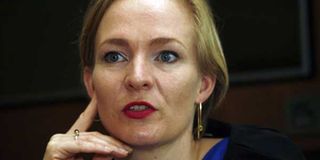Why EU election report has angered Jubilee government

European Union Election Observation Mission Kenya 2017 Chief Observer Marietje Schaake an interview at Radisson Blue hotel in Nairobi on July 23,2017. PHOTO | EVANS HABIL | NATION MEDIA GROUP
What you need to know:
- She said Kenya was not prepared to receive her and her team in Nairobi this week.
- The observers call out Jubilee leaders for their open criticism of the Judiciary.
Election observers from the European Union released their final report on Wednesday, a move that angered the government, because Nairobi’s input was not considered.
According to Kenya’s ambassador to Belgium Johnson Weru, the decision by the chief observer of the mission Ms Marietje Schaake to release the report in Brussels was “unprocedural and premature” because they had expected it to be out in mid-February or mid-March.
Ms Schaake, however, maintained that she had to release the 75-page report within three months of the October 26 repeat election. She said Kenya was not prepared to receive her and her team in Nairobi this week.
EMBARASS
In the report, the observers raised a number of points that may embarrass the Jubilee government. Because such a document stays public and can be used by European powers and other countries to inform their policy on Kenya, there are observations the Jubilee government may have wished were not placed out there for all to see.
First, the State is faulted for its action against civil society organisations. The report says they were “subject to intimidating actions by the NGOs Coordination Board just before each of the two deadlines for lodging presidential petitions (in August and November)”.
“Without a clear legal basis, the board issued letters to them that demanded, inter alia, that they cease all political operations, including all electoral-related programmes. While accountability is appropriate, the organisations concerned denied the allegations against them and in some cases pointed out that they are limited companies and therefore do not fall under the board’s oversight.
“The board’s actions go against the commitments Kenya has made in regard to creating a conducive environment for civil society. The government has been criticised for failing to implement the Public Benefits Organisations Act 2013,” state the observers.
SUPREME COURT
Secondly, the observers call out Jubilee leaders for their open criticism of the Judiciary after the annulment of the August 8 presidential election by the Supreme Court.
“Following the Supreme Court’s September 1 annulment of the presidential election, the Judiciary came under increased attack,” they wrote.
“The day before the fresh presidential election, the Supreme Court could not form the necessary quorum to hear a petition for a delay to the poll. This is highly unusual and raised serious questions among Kenyan stakeholders, including about possible political interference having prevented judges from attending the hearing. The previous day, the driver of the Deputy Chief Justice was shot and injured,” added the report.
Besides that, Jubilee’s use of public resources to campaign was singled out, with the observers saying incumbency favoured the President’s party.
“During the 141 rallies observed by EU long-term observers, 27 instances of misuse of state resources in 16 counties were witnessed. These included 18 instances involving Jubilee and four involving Nasa,” they stated.
FUNDS
They added: “There is a common perception, as well as concrete observation, of funds raised being used for alternative forms of campaigning, including inducement payments, which are widely accepted and also demanded. Video footage seen by the EU observer mission shows candidates handing out money directly to people lining up.
Long-term observers observed the distribution of money (also referred to as a ‘transportation refund’) in seven separate campaign events in Embu, Kakamega, Kwale, Mombasa, Nairobi and Nyeri counties.”
Instructively, the observer mission recommended that Parliament operationalise the Campaign Financing Act that it suspended in January 2017.
Their recommendation was that “the Parliament operationalise the Election Campaign Financing Act to regulate the amount of money received and spent by candidates and political parties during an election or referendum”.
Something that may also irk the Jubilee leadership is the EU report’s amplification of sentiments that there lacks rotation in the presidency beyond two ethnic groups.
“There were various public calls from Kenyan stakeholders to address structural problems of exclusion, Kenya’s ‘winner-takes-all’ politics, the lack of rotation in the presidency beyond two ethnic groups, and the over-reach of the government,” they state.
President Uhuru Kenyatta has on various occasions announced that William Ruto will be taking over the Jubilee Party leadership. Should Mr Ruto win the presidency in 2022.
This will mean Kenya has been led by either a Kikuyu or a Kalenjin in its 55 years of independence.





